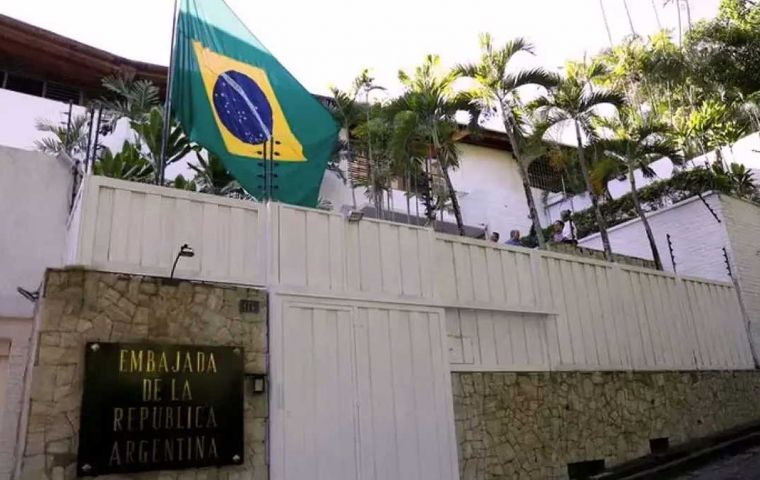MercoPress. South Atlantic News Agency
Chavista groups withdraw from Argentine Embassy adjacencies
 Brazil remains for now guarding Argentina's Embassy in Caracas
Brazil remains for now guarding Argentina's Embassy in Caracas Venezuelan pro-government militias were reported to have stopped stalking the premises of what used to be Argentina's Embassy in Caracas after former presidential candidate Edmundo González Urrutia arrived in Spain as an asylum seeker.
Six former aides to González Urrutia and disenfranchised opposition leader María Corina Machado were left behind at the premises after Argentina's team exited the country with the building placed under Brazilian protection pursuant to international diplomatic rules. Argentina has long granted asylum to these people but Nicolás Maduro's regime has consistently denied them a safe passage to the airport.
According to Buenos Aires' Clarín, González Urrutia's escape to Spain after an arrest warrant had been issued against him and the withdrawal from the Chavista groups are no separate incidents. While González Urrutia had been sheltering at the Dutch Ambassador's residence in Caracas, envoys from Argentine President Javier Milei asked the International Criminal Court (ICC) in The Hague to issue an arrest warrant against Maduro and other high-ranking officials within the Bolivarian administration.
It was feared that in this scenario the Chavista forces would break into the building to capture the six refugees, particularly after it was announced that Venezuela had revoked Brazil's authorization to guard Argentina's interests in Caracas. In addition, the electricity supply to the former Argentine Embassy had been cut off and was not restored until the news of González Urrutia's arrival in Spain went public.
After the measure was conveyed to Brazilian authorities, President Luiz Inácio Lula da Silva held an emergency meeting with members of his diplomatic staff in Brasilia. Foreign Ministry Secretary General María Laura da Rocha sat with Lula while Foreign Minister Mauro Vieira attended the gathering in a virtual manner from Oman, where he is on an official mission.
“Venezuela is forced to take this decision motivated by the evidence of the use of the facilities of that diplomatic mission for the planning of terrorist activities and assassination attempts” against President Nicolás Maduro and Vice President Delcy Rodríguez, the Venezuelan regime claimed.
Lula's administration replied that “Brazil will remain under the custody and defense of Argentine interests” until Argentina “indicates another State acceptable to the Venezuelan government to exercise the aforementioned functions.”
“The principle of the inviolability of diplomatic missions, according to the Vienna Conventions on Diplomatic Relations and Consular Relations, is sacred, and covers not only their physical spaces but also the dignity and integrity of the people present there,” Machado explained on X. “Diplomatic asylum, as a principle and institution of profound Latin American spirit, has served to protect those who are politically persecuted and has been an essential pillar of the doctrine on the protection of human rights. Its convention, signed in Caracas, is very clear about its scope and implementation. Today, it intends to be violated, precisely in this city,” she went on.
In Buenos Aires, the Argentine Foreign Ministry warned that “any attempt of interference or kidnapping of the asylum seekers who remain in our official residence will be condemned by the international community.”
“The siege to which the security forces had subjected the Argentine embassy was a clear signal, both for Edmundo and for the Spanish diplomats, that there is no safe haven right now in Venezuela,” Spain's El País wrote.
Lula's International Affairs advisor Celso Amorim said he was very shocked by Maduro's decision in defiance of the Vienna Convention. Brazil has been in charge of the custody of the diplomatic headquarters of Argentina and Peru in Venezuela since August.
Lula, who remains mum on the July 28 elections in Venezuela both Maduro and González Urrutia claimed to have won, had insisted Friday that ”Maduro's behavior [was] disappointing” and that his attitude reminded him of former Brazilian President Jair Bolsonaro, whom he defeated at the 2022 elections but who refused to accept it. Bolsonaro “spent a month crying at home without accepting defeat and thinking what to do,” Lula argued. “I think Maduro, as president, should prove that he was the favorite of the Venezuelan people, but he doesn't.”




Top Comments
Disclaimer & comment rulesCommenting for this story is now closed.
If you have a Facebook account, become a fan and comment on our Facebook Page!